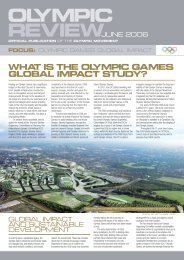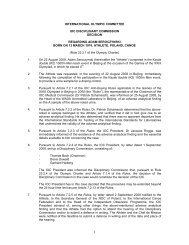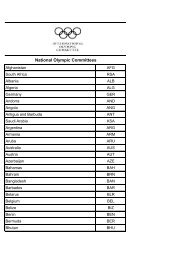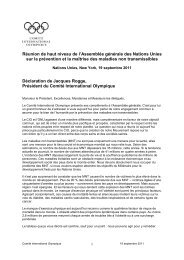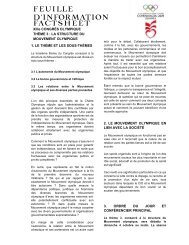7th World Conference on Sport and the Environment - International ...
7th World Conference on Sport and the Environment - International ...
7th World Conference on Sport and the Environment - International ...
You also want an ePaper? Increase the reach of your titles
YUMPU automatically turns print PDFs into web optimized ePapers that Google loves.
Report<br />
all worked toge<strong>the</strong>r with <strong>the</strong> Government of Pakistan <strong>and</strong> <strong>the</strong> Sialkot Chamber of Commerce to develop<br />
a programme to eliminate child labour. In this way <strong>the</strong> sporting goods industry, which has no expertise<br />
or even m<strong>and</strong>ate to deal with child labour, was able to enlist <strong>the</strong> cooperati<strong>on</strong> of <strong>the</strong> internati<strong>on</strong>al <strong>and</strong><br />
nati<strong>on</strong>al agencies that do. The programme has not always worked as well as it should have <strong>and</strong> if<br />
<strong>on</strong>e were to do it over again it would benefit from greater degrees of external m<strong>on</strong>itoring <strong>and</strong> more<br />
transparency but <strong>the</strong> multistakeholder approach is undoubtedly <strong>the</strong> correct <strong>on</strong>e.<br />
One could equally cite examples relating to public health or <strong>the</strong> envir<strong>on</strong>ment. In each case, business<br />
or sporting organizati<strong>on</strong>s could be adversely affected by health or envir<strong>on</strong>mental issues <strong>and</strong> <strong>the</strong>y need<br />
to be helping to deal with those issues in order to ensure <strong>the</strong>ir own l<strong>on</strong>g term prosperity. It is <strong>the</strong>refore<br />
essential that any business or sporting activity acknowledge <strong>the</strong> social c<strong>on</strong>text <strong>and</strong> its implicati<strong>on</strong>s for<br />
<strong>the</strong>m. This is key to <strong>the</strong> c<strong>on</strong>cept of sustainable enterprise, even if <strong>on</strong>ly to manage risk. It can however,<br />
(<strong>and</strong> I would argue should) go fur<strong>the</strong>r than risk management. Business or sporting initiatives mobilize<br />
significant resources <strong>and</strong> have <strong>the</strong> potential to deliver social goods that o<strong>the</strong>rwise may not be delivered. I<br />
have already referred to <strong>the</strong> provisi<strong>on</strong> of infrastructure by <strong>the</strong> extractive industries but <strong>on</strong>e could also find<br />
examples in o<strong>the</strong>r sectors. Human resource development is ano<strong>the</strong>r area in which business often steps<br />
in to improve <strong>on</strong> <strong>the</strong> educati<strong>on</strong> <strong>and</strong> training of workers provided by public bodies. In an immediate sense<br />
this may be necessary simply to ensure <strong>the</strong> competitiveness of <strong>the</strong> enterprise, but in a broader sense it is<br />
a c<strong>on</strong>tributi<strong>on</strong> to <strong>the</strong> human capital base of <strong>the</strong> society as a whole.<br />
The Internati<strong>on</strong>al Labor Organizati<strong>on</strong> (ILO), <strong>the</strong> oldest <strong>and</strong> most representative agency in <strong>the</strong> UN<br />
system, recognized this fact when <strong>the</strong>y noted that poverty anywhere threatens prosperity everywhere.<br />
Government <strong>and</strong> <strong>the</strong> social partners (business <strong>and</strong> labour organizati<strong>on</strong>s) all share in <strong>the</strong> resp<strong>on</strong>sibility to<br />
deliver social goods because any breakdown in <strong>the</strong>ir delivery will threaten all social groups, not <strong>on</strong>ly those<br />
deprived of <strong>the</strong> service. The Chinese government has recognized this potential c<strong>on</strong>tributi<strong>on</strong> <strong>and</strong> appealed<br />
to all enterprises <strong>and</strong> organizati<strong>on</strong>s to c<strong>on</strong>tribute to building a harm<strong>on</strong>ious society. In essence, this means<br />
helping to fill-in <strong>the</strong> gaps in social development. Strictly speaking, it is <strong>the</strong> job of public agencies to do<br />
that, but since o<strong>the</strong>r organizati<strong>on</strong>s would also be affected by those gaps it is in <strong>the</strong>ir interest as well to<br />
ensure that <strong>the</strong>y get filled <strong>and</strong> <strong>the</strong>y often generate resources that could c<strong>on</strong>tribute to that process.<br />
I would argue that business or sporting activities should make a c<strong>on</strong>tributi<strong>on</strong> to social development, both<br />
in <strong>the</strong>ir own short or l<strong>on</strong>ger term interests but also because it is <strong>the</strong> right thing to do. Any activity that<br />
takes broader social needs <strong>and</strong> c<strong>on</strong>cerns into account will benefit from a more c<strong>on</strong>structive relati<strong>on</strong>ship<br />
with its potential c<strong>on</strong>sumers <strong>and</strong> stakeholders. Identifying, underst<strong>and</strong>ing <strong>and</strong> resp<strong>on</strong>ding to those<br />
needs will help <strong>the</strong> company align its activities <strong>and</strong> products with society <strong>and</strong> ensure more sustainable<br />
operati<strong>on</strong>s. Helping to protect <strong>and</strong> streng<strong>the</strong>n <strong>the</strong> development of society ensures <strong>the</strong> future operating<br />
envir<strong>on</strong>ment of <strong>the</strong> company <strong>and</strong> its stakeholders <strong>and</strong> sets up a virtuous circle where each <strong>on</strong>e gains<br />
from <strong>the</strong> development of <strong>the</strong> o<strong>the</strong>r.<br />
This raises however, <strong>the</strong> issue of sustainability. Public agencies are resp<strong>on</strong>sible for delivering social<br />
goods <strong>and</strong> that is <strong>the</strong>ir core business. They should perform that role c<strong>on</strong>sistently <strong>and</strong> without favour.<br />
Businesses who decide to deliver public goods however, may not have <strong>the</strong> same commitment do so in<br />
<strong>the</strong> l<strong>on</strong>g term without any bias in favour of <strong>on</strong>e group or ano<strong>the</strong>r. A business (or a sports organizati<strong>on</strong>,<br />
for that matter) may decide at a certain point that <strong>the</strong>ir priorities have changed or that <strong>the</strong>y need to<br />
devote those resources to o<strong>the</strong>r activities <strong>and</strong> may cease to deliver a certain public good. An oil or<br />
mining company that provides educati<strong>on</strong> <strong>and</strong> health services at <strong>on</strong>e of <strong>the</strong>ir sites may eventually move<br />
when <strong>the</strong>ir extractive activity is no l<strong>on</strong>ger profitable <strong>and</strong> <strong>the</strong>y are unlikely to c<strong>on</strong>tinue to support <strong>the</strong><br />
public services <strong>the</strong>y previously provided. For this reas<strong>on</strong> it is essential that any delivery of public goods<br />
that business or sport organizati<strong>on</strong>s decide to engage in be selected <strong>and</strong> managed in c<strong>on</strong>juncti<strong>on</strong> with<br />
o<strong>the</strong>r social actors. This will help to ensure that <strong>the</strong> choice of <strong>the</strong> goods <strong>and</strong> <strong>the</strong>ir delivery mechanisms<br />
is appropriate <strong>and</strong> also that <strong>the</strong>re are partners who can c<strong>on</strong>tinue to ensure delivery even if <strong>the</strong> business<br />
or sports organizati<strong>on</strong> withdraws at some point. The o<strong>the</strong>r partners will of course require preparati<strong>on</strong> in<br />
order to be able to c<strong>on</strong>tinue without <strong>the</strong>ir business or sports partners. That implies capacity building <strong>and</strong><br />
resource allocati<strong>on</strong> to ensure that <strong>the</strong>y are ready, willing <strong>and</strong> able to sustain <strong>the</strong> activities even <strong>on</strong>ce <strong>the</strong><br />
principal partners withdraw.<br />
There are additi<strong>on</strong>al reas<strong>on</strong>s why business or sports organizati<strong>on</strong>s should work with o<strong>the</strong>r groups when<br />
delivering social goods. Firstly, <strong>the</strong> social goods in questi<strong>on</strong> may not be in <strong>the</strong> core competencies of<br />
<strong>the</strong> business or sports organizati<strong>on</strong> <strong>and</strong> so <strong>the</strong>y will need to enlist <strong>the</strong> help of specialists from o<strong>the</strong>r<br />
organizati<strong>on</strong>s. Sec<strong>on</strong>dly, <strong>the</strong> business or sports group may not be seen as a legitimate party in that field<br />
<strong>and</strong> <strong>the</strong>y can overcome that lack of legitimacy by selecting partners who are.<br />
<str<strong>on</strong>g>7th</str<strong>on</strong>g> <str<strong>on</strong>g>World</str<strong>on</strong>g> <str<strong>on</strong>g>C<strong>on</strong>ference</str<strong>on</strong>g> <strong>on</strong> <strong>Sport</strong> <strong>and</strong> <strong>the</strong> Envir<strong>on</strong>ment<br />
Internati<strong>on</strong>al Cooperati<strong>on</strong> <strong>and</strong> Development Dept.<br />
Page 194/256





